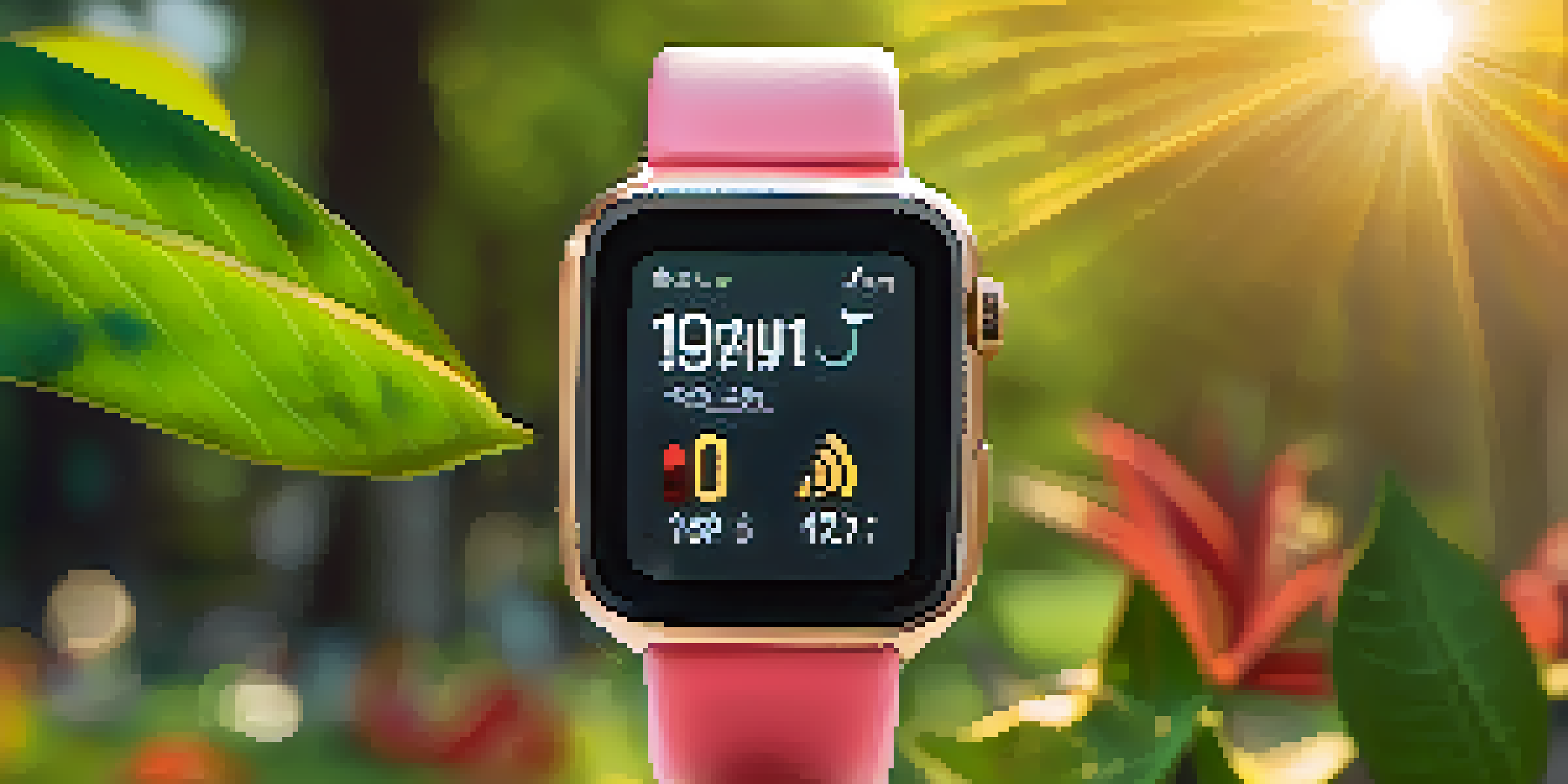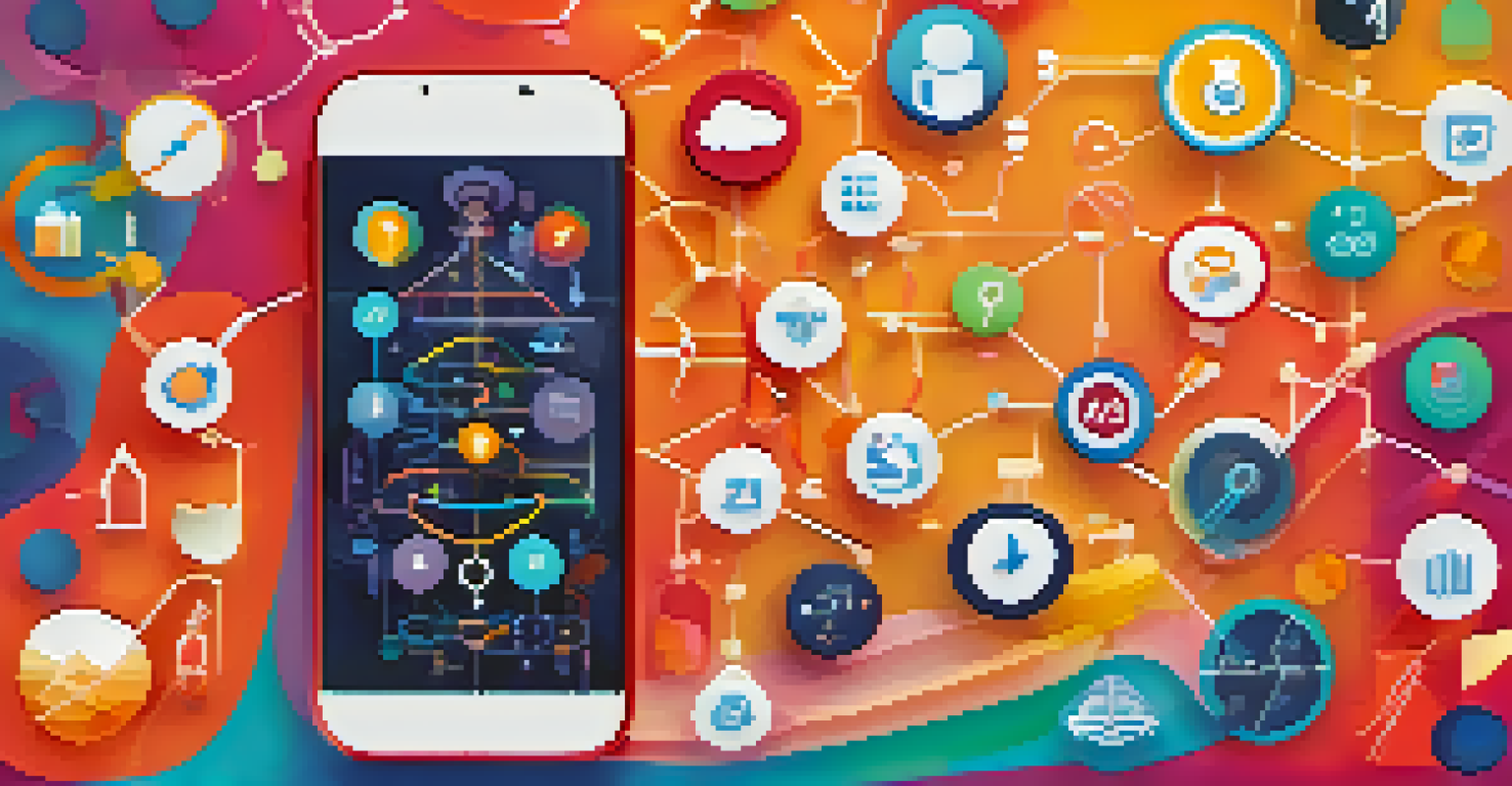The Rise of Health Apps: Integrating Wearables and Software

Understanding the Health App Phenomenon
In recent years, health apps have surged in popularity, transforming how we manage our wellness. With smartphones in nearly every pocket, these applications provide instant access to health tracking and information. They allow users to monitor everything from heart rate to sleep patterns, making health management personal and accessible.
Health is not just about what you're eating. It's also about what you're thinking and saying.
The rise of these apps is fueled by a growing awareness of health and fitness, driven in part by the pandemic. People are more proactive about their health, seeking tools that empower them to make informed decisions. This trend has made health apps a staple in daily life for many, blending technology with personal well-being.
Moreover, the integration of artificial intelligence and data analytics in these apps enhances their functionality. Users can receive personalized recommendations based on their data, creating a more tailored and effective health management experience. As a result, health apps are no longer just digital diaries; they are smart assistants in our wellness journey.
The Role of Wearables in Health Monitoring
Wearable technology has become synonymous with health tracking, and for good reason. Devices like smartwatches and fitness bands continuously monitor various health metrics, providing real-time data to users. This constant feedback loop encourages healthier habits by keeping users engaged and informed about their physical activity and overall health.

For instance, a smartwatch can track your heart rate during workouts or alert you to irregularities that may require medical attention. This capability not only promotes fitness but can also be life-saving. By wearing these devices, individuals gain insights into their health that were previously only available through medical professionals.
Health Apps Empower Personal Wellness
Health apps provide users with tools to monitor and manage their health, making wellness more accessible and personalized.
Additionally, wearables often sync seamlessly with health apps, creating a comprehensive health ecosystem. This integration allows users to visualize their data over time, making it easier to identify trends and set achievable health goals. Together, wearables and apps form an empowering partnership that enhances personal health management.
Key Features of Modern Health Apps
Today’s health apps come packed with features designed to cater to diverse health needs. From step counters and calorie trackers to guided meditation sessions, these apps offer a wide range of functionalities. Users can customize their experience according to their specific goals, whether it's losing weight, building muscle, or managing stress.
The greatest wealth is health.
One standout feature is the ability to set reminders and alerts for medication or exercise, ensuring users stay on track. This not only aids in adherence to health routines but also fosters a sense of accountability. In a world filled with distractions, these gentle nudges can make a significant difference in maintaining healthy habits.
Moreover, many health apps incorporate social elements, allowing users to connect with friends or join communities focused on health and fitness. This support network can motivate individuals to stay committed to their goals, turning healthy living into a shared experience. The combination of personalization and community is a powerful aspect of modern health apps.
Data Privacy and Security Concerns
With the rise of health apps comes the critical issue of data privacy and security. Users entrust these applications with sensitive personal information, which makes it essential for developers to prioritize security measures. Breaches or mishandling of health data can lead to serious consequences, underscoring the importance of transparency and trustworthiness.
Many health apps implement encryption and secure data storage to protect user information, but not all are created equal. Users should be vigilant and research apps before downloading, looking for those with clear privacy policies. Understanding how personal data is collected, used, and shared is crucial in maintaining control over one’s health information.
Wearables Enhance Health Tracking
Wearable devices like smartwatches offer real-time health data, promoting healthier habits and providing insights that were once only available through healthcare professionals.
Additionally, regulatory bodies are starting to step in to ensure that health apps meet specific security standards. As consumers become more aware of their data rights, the demand for secure and transparent health apps will likely grow. This shift will encourage developers to prioritize user safety, ultimately benefiting everyone in the health app ecosystem.
The Impact of Health Apps on Lifestyle Changes
The influence of health apps extends beyond mere tracking; they can significantly impact lifestyle changes. By providing users with accessible data about their habits, these apps empower individuals to make healthier choices. For many, this newfound awareness leads to more informed decisions about diet, exercise, and overall well-being.
For example, a user who regularly logs their food intake may begin to notice patterns that lead to healthier eating habits. The app’s feedback can encourage them to try new recipes or focus on nutritional balance. This shift towards mindful eating is just one way that health apps facilitate positive lifestyle changes.
Moreover, health apps often gamify the experience, turning fitness goals into fun challenges. Users can earn rewards for achieving milestones, fostering a sense of accomplishment and motivation. By making health management engaging, these apps help sustain long-term commitment to healthier lifestyles.
Future Trends in Health App Development
As technology continues to evolve, so too will health apps and their functionalities. Future developments may include even more sophisticated tracking capabilities, such as continuous glucose monitoring for those with diabetes or advanced sleep analytics. These innovations will further personalize health management, catering to the unique needs of each user.
In addition, the integration of telemedicine features into health apps is on the rise. This allows users to consult healthcare professionals directly through the app, making healthcare more accessible and convenient. Such features can bridge the gap between personal monitoring and professional guidance, enhancing overall health outcomes.
Data Privacy is Crucial in Health Apps
As health apps grow in popularity, ensuring data privacy and security is essential to maintain user trust and protect sensitive personal information.
Lastly, as artificial intelligence becomes more prevalent, we can expect health apps to offer predictive analytics. This means that instead of just tracking what has happened, apps may begin to predict potential health issues based on user data. Such advancements could revolutionize preventive healthcare, allowing individuals to take proactive measures before problems arise.
Conclusion: Embracing the Health App Revolution
The rise of health apps signifies a transformative shift in how we approach personal wellness. By integrating wearables and software, these tools empower individuals to take control of their health like never before. With a wealth of data at their fingertips, users are better equipped to make informed decisions that can lead to improved well-being.
While challenges such as data privacy remain, the overall benefits of health apps are undeniable. They promote healthier lifestyles, foster community support, and provide valuable insights into our bodies. As technology advances, we can expect health apps to continue evolving, becoming even more integral to our daily lives.

Ultimately, embracing the health app revolution means embracing a proactive approach to our health. By leveraging these tools, we can navigate our wellness journeys with confidence, making informed choices that lead to a healthier future.